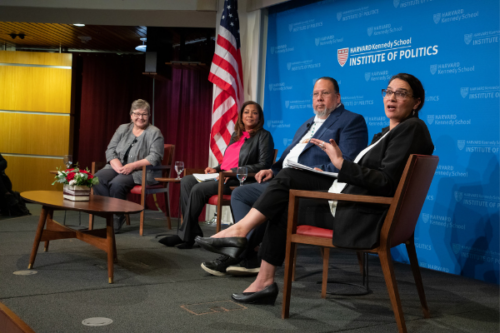
Commentary
How Maduro’s Dictatorship Plans to Survive
Even with Nicolás Maduro gone, the fight for Venezuela’s future is far from over. Freddy Guevara warns that Maduro’s successors are more interested in regime survival than democratic reform.
Read the latest news, commentary, and analysis from the Ash Center.
Commentary
Even with Nicolás Maduro gone, the fight for Venezuela’s future is far from over. Freddy Guevara warns that Maduro’s successors are more interested in regime survival than democratic reform.
Newest
Video
The 2020 election saw a dramatic increase in Asian American Pacific Islander (AAPI) voter participation—increasing ten percentage points over 2016. In the runup to the 2022 midterm elections, how will political parties continue to court AAPI voters? What strategies work to reach the growing AAPI community?
Video
Join us for a book talk with Roselyn Hsueh, Temple University Associate Professor of Political Science and author of the forthcoming “Micro-Institutional Foundations of Capitalism: Sectoral Pathways to Globalization in China, India, and Russia” (Cambridge University Press, 2022). Hsueh discussed how her book’s Strategic Value Framework shows that the perceived strategic value orientation of state elites rooted in significant phases of internal and external pressures shape dominant patterns of market governance, which vary by country and sector within country. Specifically, Hsueh’s research demonstrates techno-security developmentalism in China has shaped bifurcated capitalism, which governs dual-use capital- and knowledge-intensive versus labor-intensive industries. In India, neoliberal self-reliance has determined the bifurcated liberalism, which grounds transnationally networked high-tech versus rural, small-scale sectors. A bifurcated oligarchy governs defense and resource-oriented versus labor-intensive sectors in Russia shaped by resource security nationalism.
Edward Cunningham, Adjunct Lecturer in Public Policy, Director of Ash Center China Programs and of the Asia Energy and Sustainability Initiative at Harvard Kennedy School, moderated.
This discussion was co-sponsored by the Davis Center for Russian and Eurasian Studies, Harvard Kennedy School China Society, Fairbank Center for Chinese Studies, and Lakshmi Mittal and Family South Asia Institute.
Feature
Listening to and learning from people of color and Indigenous people is critical to tackling climate and racial injustice.
Q+A
How do long- and short-term European subnational economic conditions impact attitudes toward the EU?
Video
Tune in to a virtual book talk featuring former Ash Center Postdoctoral Democracy Fellow LaGina Gause, Assistant Professor of Political Science at the University of California, San Diego. Gause, author of “The Advantage of Disadvantage: Costly Protest and Political Representation for Marginalized Groups,” was joined by respondent Hahrie Han, Professor of Political Science at Johns Hopkins University. Archon Fung, Winthrop Laflin McCormack Professor of Citizenship and Self-Government at Harvard Kennedy School, Director of the Ash Center’s Democratic Governance Programs, moderated.
This event was co-sponsored by the Center for American Political Studies (CAPS).
Media Release
Video
Join the Ash Center for an online conversation with Donald Cohen, co-author of “The Privatization of Everything: How the Plunder of Public Goods Transformed America and How We can Fight Back” (The New Press, 2021). Lizabeth Cohen, the Howard Mumford Jones Professor of American Studies in the History Department at Harvard University, served as moderator.
Feature
Analysis by Harvard Kennedy School’s Pippa Norris and co-author Kseniya Kizilova shows nationalism and desire to protect democratic freedoms motivate Ukrainian citizens to resist Russia’s invasion.
Video
Join the Ash Center for an online book talk with Michael Kazin, author of “What it Took to Win: A History of the Democratic Party” (Macmillan, 2022). Randall Kennedy, the Michael R. Klein Professor at Harvard Law School served as moderator.




